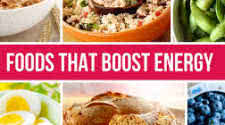Energy Foods List - Complete List of Energy Diet Foods for Athletes

Understanding the Facts behind the Foods you eat is Essential
Who doesn't want more energy? Think of how much harder you could train with that extra bit of oomph, and how much
faster you could add slabs of lean muscle. Beyond energy to exercise, though, you need energy to work, to study,
to think, even to relax.
How do you get energy? From food, obviously. The first energy food to come to mind might be sugar in its various
forms. Refined simple carbs like sugar do provide energy, but they aren't the answer to an athlete's energy needs.
You must eat a combination of simple and complex carbs at the right times to provide the energy you need when you
need it.
Fast Burners & Slow Burners
If you have some knowledge of nutrition, when you think of energy you might not think of sugar but of the glycemic index. This is a guide to how quickly foods raise blood glucose. Generally, the higher the index, the faster the food provides energy. While high-glycemic foods are good for quick energy, eating too many may give you bursts of energy only to be followed by sluggish energy lows.Mixing high-, medium- and low-glycemic foods - plus eating high-fiber and mixed-nutrient foods - allows for sustained energy. A bodybuilding eating plan of frequent small meals also helps keep your energy levels on an even keel.
Muscle Fuel
The muscles themselves store some fuel in the form of glycogen. Regular training helps build the storage capacity for this fuel, and you need to replenish it for your next exercise session. Replacement occurs at a slow but steady pace. Sports nutritionist Nancy Clark, MS, RD, recommends in her Sports Nutrition Guidebook (Human Kinetics, 1997) that you consume about 300 calories of carbohydrate every two hours for 6-8 hours after working out.Endurance athletes need to be most concerned about carb replenishment. Other athletes can replenish adequately just by eating a nutritious diet. Clark advises choosing mainly whole foods when you recarb; they generally have more vitamins and minerals than carb drinks.
The traditional bodybuilding formula of eating smaller, more frequent meals works well for energizing the athlete. Always start your day with a good breakfast. Research shows that subjects who consumed breakfast and a snack could perform about 20% more work than subjects who just had water, says Clark.
Don't Overdo
If one energy bar is good, are two better and three best? No. If you eat more than your body's immediate needs, you could end up storing most of the surplus as excess fat - the last thing an athlete or any health-conscious person wants. Remember, too, that you want a lot of variety in your meals to get a better mix of different nutrients. Instead of that second energy bar, have some fruit or complex carbs a few hours later.Lighting the Fire
No matter how much energy fuel you have, it won't do you any good if you can't burn it. That's where vitamins, minerals and water come in.You may have heard that vitamins don't provide energy. Well, they don't have calories, but some of them, B vitamins in particular, do aid in metabolism. That's why we consider certain foods high in B vitamins as energy foods. Not only do milk, grains, fruit, fish, meat (lean, of course), beans and selected vegetables provide calories, but they also provide different B vitamins that are involved in various metabolic functions.
Even minerals are involved in the energy equation. If you're deficient in iron or anemic, you feel tired much of the time and don't have the energy to train. Some athletes are more at risk of iron deficiency, Clark explains. They include females (who lose iron during menstruation); teenage athletes (especially girls) who need iron for growth; athletes who don't eat red meat, a main source of iron; and endurance athletes, who may lose significant iron through sweat. Marathon runners in particular might also damage red blood cells due to the pounding of their feet on the ground.
Water, Water
Water doesn't provide calories, but it's still a vital part of your energy equation. Among its many functions, you need it to digest food and to carry nutrients to your cells. "The same athletes who earn an A+ for eating wisely often flunk hydration," states Clark.In her book Power Eating (with Maggie Greenwood-Robinson, Human Kinetics, 1998), Susan Kleiner, PhD, RD, reports, 'A water deficit of just 2% -4% of your bodyweight can cut your strength-training workout by as much as 21% if you're dehydrated - and your aerobic power by a whopping 48%."
8 Energy Foods
A varied, high-nutrient diet is the best way to meet your energy and other nutrition needs. Convenience and taste are also important. Consider these foods when you want to ensure energy to spare.Sports drinks. Allow for quick absorption of replacement carbs during and after exercise. Choose those drinks that have about 50 calories per 8 ounces. Regular soft drinks are way too concentrated.
Sports nutrition bars. Convenient, tasty, providing measured amounts of complex and simple carbs. Many have added benefit of fiber.
Bananas. Tried-and-true athlete's food. Convenient and nutritious.
Oranges. Whole fruit allows for slower digestion of simple carbs. Distance runners grab quartered oranges for refueling during races.
Bagels. Grain foods provide complex carbs. The chewy texture makes bagels a filling, substantial food.
Pasta. The endurance athlete's traditional carb-loading meal. Bodybuilders need moderate portions along with other nutrients.
Dried Fruit. Convenient and portable, they taste good and provide fiber, potassium and often iron. Apricots and peaches are loaded with carotenoids.
Water. No calories to burn as energy, but your body needs to be adequately hydrated to produce the energy for you to train optimally.